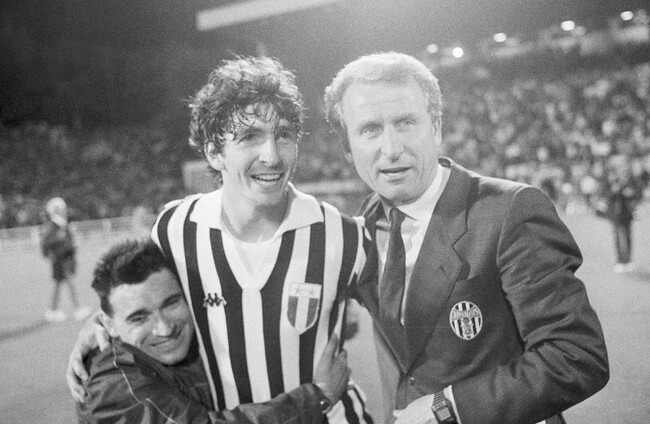1. ”He’d come to our matches on Sunday, and we’d go out after for a meal. Myself, Tardelli and him, a few friends outside football, our wives. After, we’d go back to someone’s house and watch the football — the Italian Match of the Day. Paolo liked a cigarette and one or two glasses of wine. But he was a man for moderation.
“Late that season, word broke Juve were going to sign Michel Platini, so I’d be on my way out. It was a tough time, personally. I loved the place. We’d won the Scudetto the year before and were challenging again. At a frustrating time for himself, I’ll always remember how supportive Paolo was.
“And I’m delighted we got three games together. His ban was up and Giovanni Trapattoni had no hesitation in putting him straight in the team. And he scored in his comeback match — a 5-1 win away at Udinese.
“He played the next two games and we won the title on the last day with that penalty I wasn’t supposed to take. There’s a good photo of Paolo chasing me in the celebrations.
“Then off he went to the World Cup with just three games under his belt in two years.”
2.”Now, at the age of 42, he has been diagnosed with early onset dementia and probable chronic traumatic encephalopathy. “It’s the rugby that’s put me through this,” he says. And that’s why, if he could, he would undo all of it. “Some people go for the big lights, whereas I don’t want that. I never wanted that. I’d rather just have had a normal life.”
“Thompson was on a job in Kendal not long ago, living away from home while he was repairing a burst water main. While he was there they were showing some of the England games from the 2003 World Cup on TV. He had never watched them back before, except for little bits and pieces when they were doing their post-match analysis during the tournament. But he did now.
“And it was as if I was watching England play now. Except I was there. But I can’t remember at all being there. Honestly, I don’t know scores from any of the games.” A lot of his career is like that, patchy and full of gaps. He used to pride himself on his memory and have a head full of complicated lineout calls. “If you put them in now, not a chance. Not a chance.”
3. “I remember 1984, sitting in front of a television with my parents as we watched the opening ceremony of the Summer Olympics. Johnson, then 49, strode the stairs of the Los Angeles Memorial Coliseum to light the Olympic torch.
“If you want to be like someone, my father said, reiterating something he had been telling me for years, “be like Rafer Johnson.”
“It made sense. Johnson and my father had a fair amount in common. They didn’t know each other, but both were proud Black men who were born during the 1930s and were teens in the dusty interior of California during the 1940s. Both competed as college athletes on the West Coast. My father became the only African-American player on the Oregon Ducks basketball team. At U.C.L.A., Johnson played basketball for John Wooden before focusing on track.
“Growing up, as I did, with idealistic parents who crossed the colour line to marry in 1954, athletes like Johnson, Jackie Robinson and Arthur Ashe were held up as the ideal. Such reverence was about how these sports stars carried themselves as African-Americans — and the way they blended sports with scholarship, committed to helping others and embraced all parts of humanity.”
4. “Between acquainting herself with her new team – who she says were supportive straight away – and studying for finals over the last two weeks, Fuller has also maneuvered instant celebrity. Fuller’s unexpected turn as a trailblazer has garnered her national appearances on Good Morning America and CNN, and drawn praise from the likes of LeBron James and Megan Rapinoe. It helps that the 6ft 1in Texan isn’t a stranger to sticking out of a crowd. Literally.
“From elementary through junior high school, Fuller was the tallest student in her class – boy or girl. Yet, while other kids might have wilted at being different, Fuller embraced her size. Fuller’s father, a project manager for a construction company, stands at 6ft 2in; while her mother, a teacher, is a lanky 5ft 10in. Both of Fuller’s grandfathers are 6ft 5in.
“My parents always hyped me up about [being tall],” Fuller said. “Everyone always told me how tall and athletic I was [in a positive way.] I was very confident about it. I still am today. I’ll go out and play sports or I’ll put on a dress and heels and be 6ft 5in.”
5. “Over 12 years professionally at that level for Southampton, and to round off my career with a testimonial, being a foreign player and club captain for many years, was something very special.”
“More than 18,000 supporters were at St Mary’s to watch that testimonial, as Southampton took on Celtic in July 2008. Still struggling with injury, Lundekvam was only able to play the last few minutes but he entered and left the pitch to rapturous applause.
“It signalled the end of his Saints career, and the start of a more troubled time.
“Within a year of that match, Lundekvam was totally lost in a haze of drink and drugs. The structure and routine of professional football had suddenly disappeared. The familiar cycle that he had known for so long – train, travel, play, recover – was left behind.
“Days on the south coast stretched out in front of him with nothing to fill them. Suffering from a complete lack of purpose and motivation, he turned to alcohol and then cocaine in search of an answer that never arrived.”


